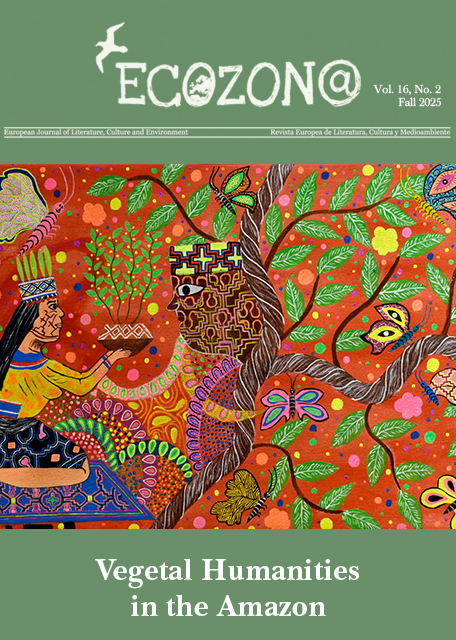"Le Jardin d’Allah": Ecological Sensibilities in the Francophone Caribbean
DOI:
https://doi.org/10.37536/ECOZONA.2023.14.1.4826Parole chiave:
agroecology, francophone literature, gardening, soil ecology, the CaribbeanAbstract
When gardening and Caribbean islands are mentioned, one cannot but think of Jamaica Kincaid and of the way in which she has articulated the complex relationship between colonialism and gardens, between people and notions such as place and situatedness. The very idea of nature in the Caribbean is strongly connoted, bearing the brunt of age-old associations with exoticism, mystery, unpredictability, or even madness. The symbolic meanings gardens take on in this region are therefore numerous and multifaceted, and if some have been lengthily discussed, others might still be worth exploring. Such is the case of backyards and vegetable gardens in Maryse Condé’s En Attendant la Montée des Eaux: in a violence-torn, poverty-afflicted, and politically unstable Haiti, the orphaned Movar makes people’s lives more bearable by recreating beauty around them, and by giving order to their unruly surroundings. His actions are more than a simple imposition of man over nature, they are also a metaphoric restoration of a lost balance, long forgotten because of other men’s blind exploitation of both human and natural resources in an environment rendered all the more fragile by its fluctuating weather patterns. This paper presents some considerations on Caribbean soil ecologies, with a particular focus on Guadeloupe and Haiti, and on the ways in which the gardener-garden relationship might contribute to restoring damaged ecosystems. Through the character of Movar and the Jardin d’Allah he tends to, concepts such as care time, reciprocal gardening and plant agency are explored. The precarious contexts in which acts of gardening take place allow for the words of Maryse Condé to be read as a paradigm for finding rootedness and balance in a politically, socially, and ecologically suffering world. Finally, Movar’s story is translated on a global scale, as an effective model of social sustainability and responsibility.
Downloads
##submission.downloads##
Pubblicato
Fascicolo
Sezione
Licenza
Authors who publish with this journal agree to the following terms:
a) Authors retain copyright and grant the journal right of first publication with the work simultaneously licensed under a Creative Commons Attribution License that allows others to share the work with an acknowledgement of the work's authorship and initial publication in this journal (CC BY-NC for articles and CC BY-NC-ND for creative work, unless author requests otherwise.
b) Authors are able to enter into separate, additional contractual arrangements for the non-exclusive distribution of the journal's published version of the work (e.g., post it to an institutional repository or publish it in a book), with an acknowledgement of its initial publication in this journal.
c) Authors are permitted and encouraged to post their work online (e.g., in institutional repositories or on their website) prior to and during the submission process, as it can lead to productive exchanges, as well as earlier and greater citation of published work (See The Effect of Open Access).










